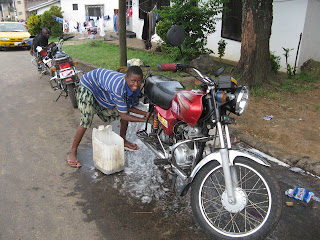 Motorcycles are everywhere in Monrovia.
Motorcycles are everywhere in Monrovia.
During the Liberian civil war combatants and refugees sought refuge in neighbouring Guinea. Inspired by the enterprising young Guineans running their own business, Liberians returned with an idea to fill the transportation gap in their country ravaged by years of war. Former Combatants used the money they received from the DDRR process to purchase inexpensive Chinese motorcycles and lease them to drivers.
The business model exploded.
The work serves as good employment for scores of unemployed young men - an estimated 75% or more are former combatants. It also provides employments for younger members of society, as motorcycles washers. The children use the money to pay excess school fees.
But the model isn’t perfect. This mode of transportation is dangerous. Daily there are several crashes resulting in severe injuries and sometimes death. The bikers do not wear protective gear – neither do their passengers – and outside Monrovia, it’s rare that they have a license. The bike riders have a tenuous relationship with the police and some members of the community who see the bike gangs as unsafe. Altercations with the police have left some police stations up in flames. Police and community members know bike riders can organise quickly and as a result there is unease about the gangs of bike riders.
It’s something the police are going to have to work with. Motorcycle taxis, or “motos” as they are known in some areas are becoming an increasingly common mode of public transportation in West Africa. It is inexpensive, the bikes are easy to maintain, and business is flourishing as a result of limited public transportation options. More importantly, they are fast. They can weave in and out congested traffic on overcrowded streets.
 There is work to further professionalize the practice – realising that it provides much needed employment to young men (from what I’ve gathered there aren’t any female bike riders). NGOs, the UN and even the World Bank have worked with the Bike Riders Association – their informal union – to increase licensing, encourage safer practices and facilitate dialogue between the police and the bike riders. These actions have some effect, yet more is likely needed to improve the safety of the community and the riders themselves. Much more needs to be done to build trust between the police and the bike riders.
There is work to further professionalize the practice – realising that it provides much needed employment to young men (from what I’ve gathered there aren’t any female bike riders). NGOs, the UN and even the World Bank have worked with the Bike Riders Association – their informal union – to increase licensing, encourage safer practices and facilitate dialogue between the police and the bike riders. These actions have some effect, yet more is likely needed to improve the safety of the community and the riders themselves. Much more needs to be done to build trust between the police and the bike riders.
No comments:
Post a Comment